Inauguration Ceremony of Peking University’s Analytics Lab for Global Risk Politics and Academic Seminar on "Global Risk Politics and Digital Global Governance"
The Inauguration Ceremony and Academic Symposium on "Global Risk Politics and Digital Global Governance" hosted by the School of International Relations at Peking University were successfully held on May 13, 2023, at the Autumn Grove Lecture Hall on Peking University's campus. Distinguished experts and scholars from domestic and international universities and research institutions, including the Central Party School, the Chinese Academy of Social Sciences, Tsinghua University, Fudan University, Renmin University of China, China University of Political Science and Law, the Graduate School of the Chinese Academy of Social Sciences, the Foreign Affairs College, Beijing Language and Culture University, the School of International Relations, Harvard University, Princeton University, Massachusetts Institute of Technology, Washington University in St. Louis, American University, University of Cambridge, University of London, Durham University, Mannheim University in Germany, Mohamed VI Polytechnic University in Morocco, Seoul National University in South Korea, and others, gathered both online and offline to witness the establishment of the Lab. They engaged in in-depth discussions and exchanges on the major topics and cutting-edge issues related to "Global Risk Politics and Digital Global Governance." Over 200 officials, researchers, and representatives from the National People's Congress, the Ministry of Commerce of China, higher education institutions, research institutes, publishers, academic journals, and think tanks attended the conference. The opening ceremony was presided over by Professor Zhang Haibin, Associate Dean of the School of International Relations at Peking University.
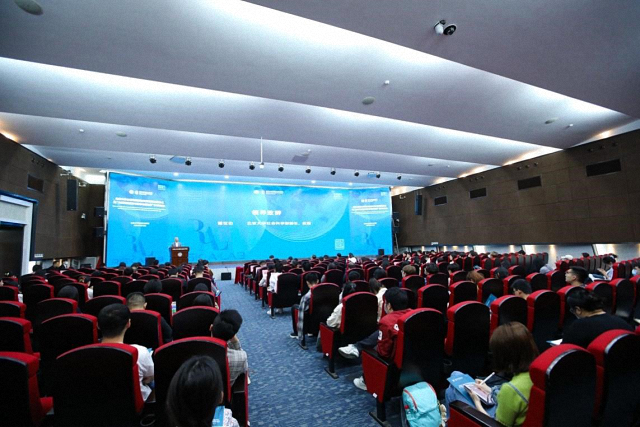
Ceremony picture
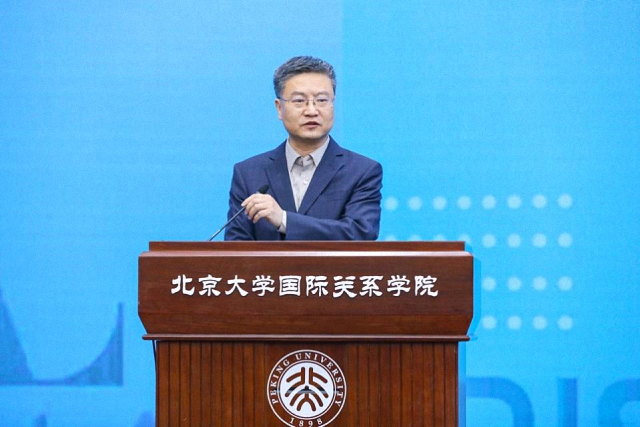
Prof. Zhang Haibin
After the opening ceremony, Professor Tang Shiqi, Dean of the School of International Relations at Peking University, delivered a welcome address. He expressed warm welcomes and sincere gratitude to the domestic and international guests attending the conference. He pointed out that the current global situation is complex and ever-changing, with increasing risk factors. The establishment of the Global Risk Political Analysis Lab at Peking University is a crucial part of the school's discipline and national security studies. The Lab aims to promote collaboration and frontier research on global risks, seek innovative solutions for digital global governance, and integrate interdisciplinary perspectives and approaches to identify, monitor, predict, prevent, and manage critical geopolitical, economic, and sustainable development risks. He emphasized that risk politics, rather than political risk, involves studying risk issues using political science methods. The future development direction of the Lab is to become an open and innovative platform for domestic and international experts, promoting comprehensive security theory research and global risk political analysis. Finally, he expressed heartfelt thanks to the strong support and guidance provided by Peking University's Department of Social Sciences during the preparation and establishment of the Lab.
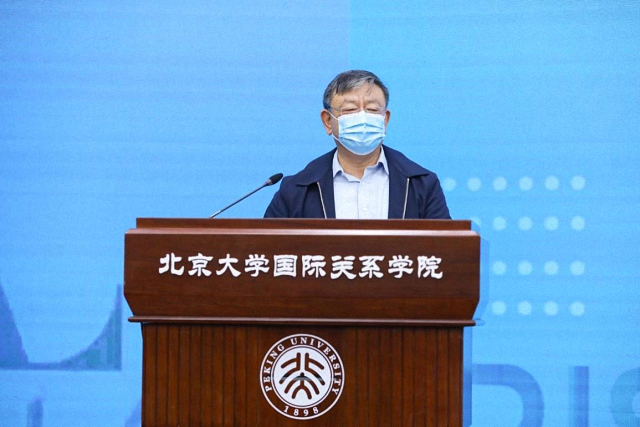
Prof. Tang Shiqi
Professor Tang Shiqi's address was followed by Professor Qiang Shigong, Director of the Department of Social Sciences at Peking University. In his speech, Professor Qiang congratulated the establishment of the Peking University Global Risk Political Analysis Lab and the successful convening of the symposium. He warmly welcomed the domestic and international guests and emphasized the importance of strengthening risk thinking and enhancing the ability to prevent and control major risks, in line with General Secretary Xi Jinping's emphasis on risk prevention and control. He highlighted the need to deepen risk thinking, establish a sound mechanism for risk assessment and coordination, improve the ability for dynamic risk monitoring and real-time warning, and contribute to the overall security of both domestic and international developments. Professor Qiang emphasized the significant practical and theoretical significance of the establishment of the Lab in this context. He praised Peking University's proactive promotion of new disciplines and digital humanities construction and acknowledged the importance of the Global Risk Political Analysis Lab as a crucial part of this initiative. He assured continued support from the university for the Lab's future development and encouraged the Lab to be innovative and produce outstanding academic achievements that contribute to effective global risk management.

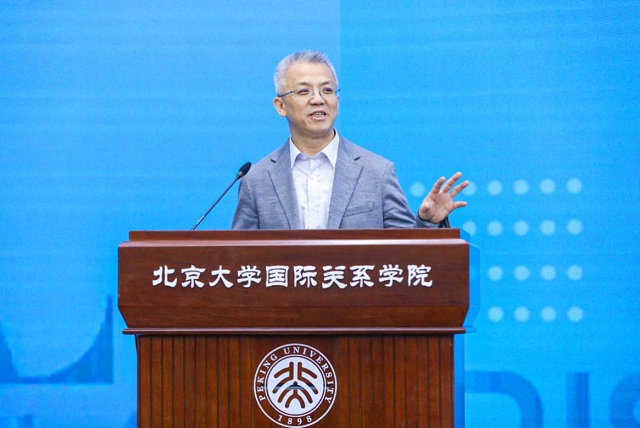
Prof. Jiang Shigong
Following Professor Qiang's address, a video message was received from Professor Andrew D. Martin, President of Washington University in St. Louis and a fellow of the American Academy of Arts and Sciences. Professor Martin praised the establishment of the Peking University Global Risk Political Analysis Lab as an important initiative in research innovation by Peking University. He recognized it as a milestone in the field of global risk studies and expressed confidence that this interdisciplinary research institution would become a valuable resource for global researchers, policymakers, and practitioners seeking innovative solutions to urgent and profound global issues. He conveyed his continuous interest in the Lab's pioneering research and looked forward to the opportunity to visit the Lab in the future.

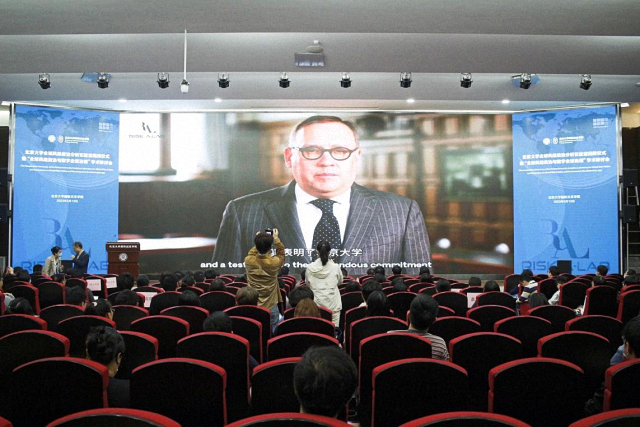
Prof. Andrew D. Martin
Next, Professor Zhang Zhixue, Director of the China Social Science Survey Center at Peking University, Convener of the Management Innovation Interdisciplinary Platform, Director of the Behavioral Science Research Center at Guanghua School of Management, and Distinguished Professor at Guanghua, delivered his speech. Professor Zhang highlighted the role of the Lab as an academic community facilitating problem-solving. He expressed anticipation for the Lab's use of scientific methods and experimental paradigms to explore serious international risk issues multidimensionally and at various levels. He believed that the Lab's development, combining theoretical construction, big data, surveys, and other methods, would enrich our understanding of international politics and global risks.

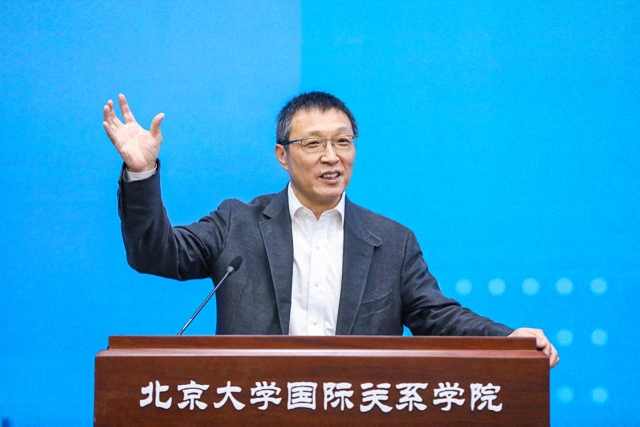
Prof. Zhang Zhixue
Following Professor Zhang Zhixue's speech, Professor Gary King, a member of the National Academy of Sciences, a fellow of the American Academy of Arts and Sciences, and the Director of the Institute for Quantitative Social Science at Harvard University, delivered a video message. Professor King warmly congratulated the establishment of Peking University's Global Risk Political Analysis Lab and extended an invitation for the Lab to join Social Science One, a community composed of global social science research centers. He shared his personal experience in establishing the Institute for Quantitative Social Science at Harvard, emphasizing the commonality of outstanding social science laboratories in forming academic communities and supporting scholars' research through platform building. Professor King highlighted the close cooperation already established between Harvard University and Peking University and sincerely looked forward to deepening collaboration and exchange between the Harvard Institute for Quantitative Social Science and the Peking University Global Risk Political Analysis Lab in the future.

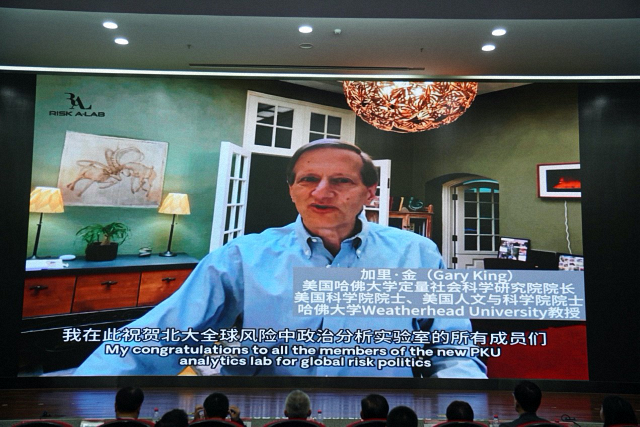
Prof. Gary King
Subsequently, Professor Helen V. Milner, a member of the National Academy of Sciences, a fellow of the American Academy of Arts and Sciences, and the Director of the Niehaus Globalization and Governance Center at Princeton University, sent a video message. She expressed her hope for collaboration between Peking University's Global Risk Political Analysis Lab and corresponding research institutions in the United States, especially her center. She emphasized the urgency of jointly exploring solutions to urgent and challenging global issues such as climate change, imbalanced economic development, and geopolitical risks. Professor Milner believed that collaboration between nations could enhance, rather than diminish, each other's sense of security, avoiding security dilemmas.

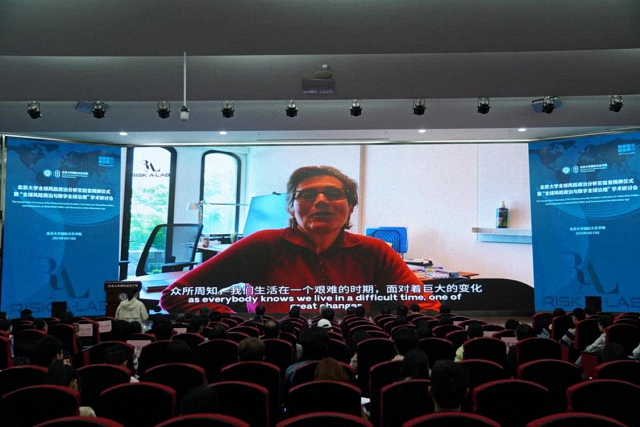
Prof. Helen V. Milner
In the next video message, Professor Thomas König, a member of the German Academy of Sciences, Director of the German National Science Foundation Collaborative Research Center, Director of the European EITM Project, and Professor at the University of Mannheim, congratulated the establishment of the Lab. He expressed high appreciation for the Lab's research tasks and methods. Professor König pointed out the challenges of interdisciplinary collaboration due to disciplinary specialization and collective action dilemmas in cooperative work. He hoped to see the Lab overcome these challenges with innovative approaches and methods to address the significant challenges in risk assessment arising from strategic interactions and networked complex games.

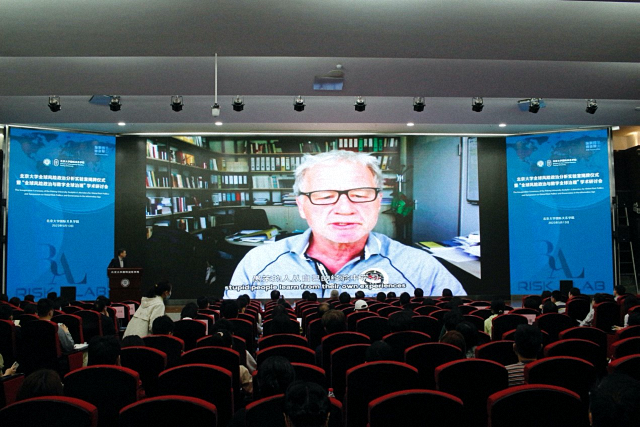
Prof. Thomas König
Following Professor König's message, Professor Jeff Gill, Director of the Big Data Science Center at American University, Editor of Political Analysis, and former President of The Society for Political Methodology, praised the establishment of the Lab as a great advancement. He stated that the 21st century is the century of data, with rapid developments in data science, machine learning, and artificial intelligence. He considered this period the most crucial time to apply computational social science to global risk and political instability research. With the quiet onset of the fifth technological revolution, Professor Gill believed that the establishment of the Peking University Global Risk Political Analysis Lab would help people understand the interaction between world politics and global risks.

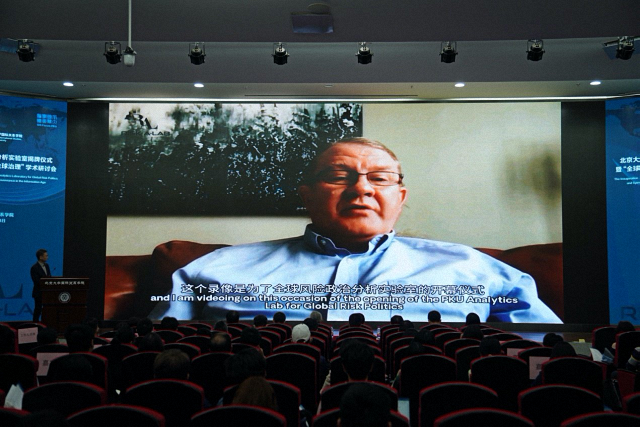
Prof. Jeff Gill
In the following video message, Professor Jorge E. Viñuales, Director of the Cambridge Centre for Environment, Energy, and Natural Resource Governance and Chair of the Department of Land Economy at the University of Cambridge, praised the timely establishment of the Lab. He highlighted the importance of Lab research topics in the current critical decade, characterized by evolving information technology and increasing inequality. Professor Viñuales believed that the world was ripe for significant change, and the use of data and model-building had great potential in transitional research, especially in the face of sustainable transformation issues. He looked forward to more exchanges and cooperation with the Lab in the future and expressed his intention to continue following the Lab's research output.

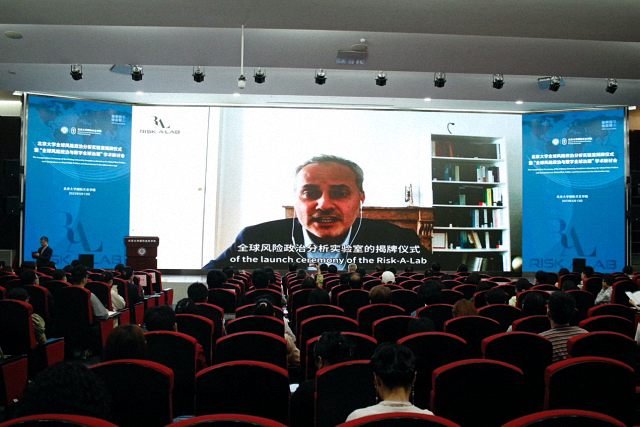
Prof. Jorge E Viñuales
In the final video message, Professor Jong Hee Park, Director of the Global Data Center at Seoul National University's Global Research Institute, expressed excitement about the establishment of this interdisciplinary research center. He commended Peking University's foresight and commitment to creating a safer, more reliable, and sustainable world. Professor Park acknowledged the complexity and interconnectedness of global risks faced today, emphasizing the need for collaborative efforts by all stakeholders to address them. He hoped that the Lab's establishment would be a significant aid in solving these problems.

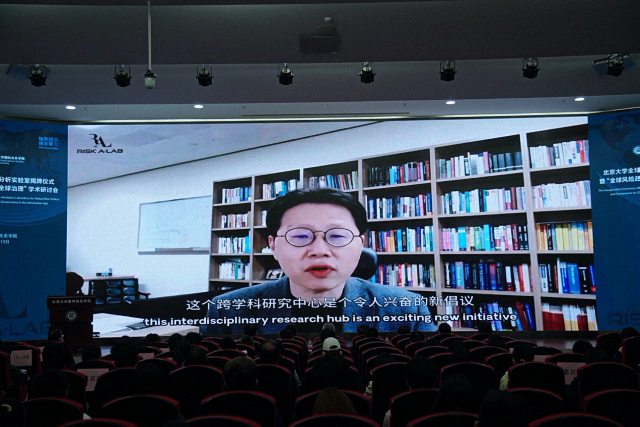
Prof. Jong Hee Park
Following the conclusion of the speeches, the inauguration ceremony of Peking University's Global Risk Political Analysis Lab took place, and honorary certificates were awarded to the "Global Risk Political Quantifighters."

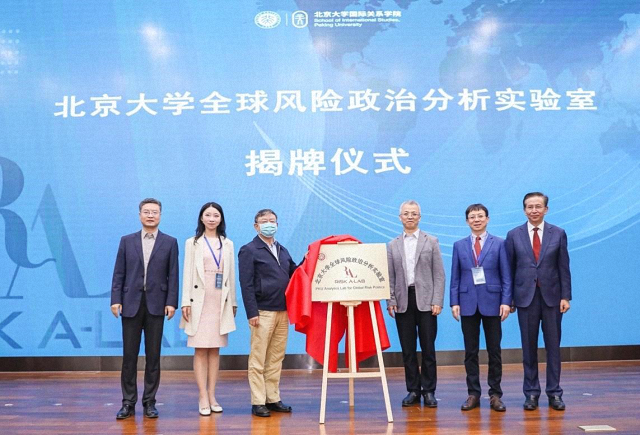
Inauguration Ceremony of the PKU Risk-A-Lab

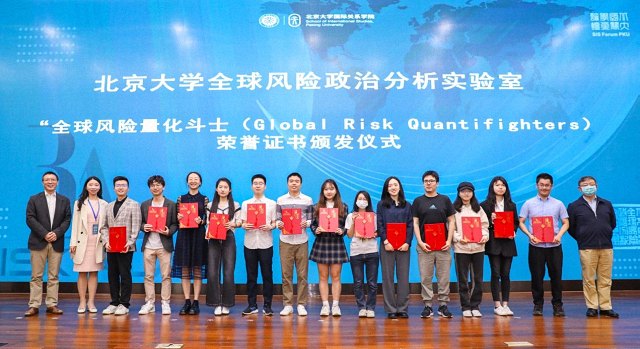
Award Ceremony for "Quantifighters of Global Risk Politics"
After the ceremony, Professor Pang Xun, Director of Peking University's Global Risk Political Analysis Lab and a professor at the School of International Relations, provided a comprehensive overview of the Lab to the participants. She first expressed gratitude for the trust and support from the school and colleagues, then detailed the Lab's research mission, tasks, construction process, and future vision. Professor Pang believed that the current intertwining of risk and politics has become a crucial part of political discourse, diminishing the interpretative and predictive power of traditional disciplinary divisions and paradigm frameworks. Therefore, the Lab aims to explore new evidence-based global governance models in an era of high uncertainty. The Lab will focus on four main directions: global risk political theory research, specific topic research, data and method research, and decision and policy research. It seeks to be characterized by interdisciplinary, balanced between fundamental and applied research, bold innovation, and driven by scientific spirit and social mission. Professor Pang acknowledged the challenging journey ahead for the Lab's construction and hoped that more like-minded individuals would join, pooling various strengths and wisdom to construct a new framework for risk, security, and resilience in an era of high uncertainty, serving the security and well-being of the nation, market, society, and individuals.

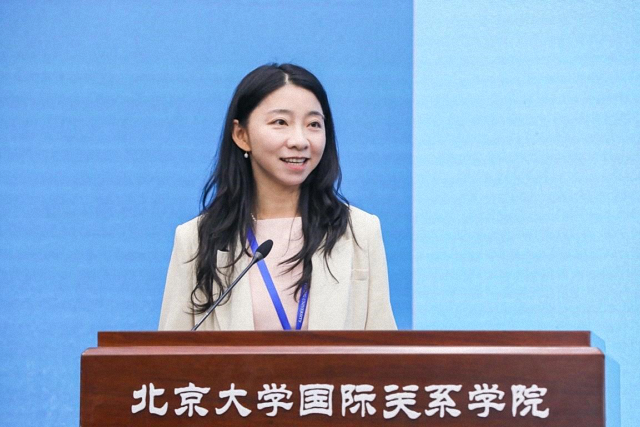
Prof. Pang Xun
Following Professor Pang's introduction, the conference entered the keynote speech session, with Professor Wang Yong, Director of Peking University's American Studies Center and a professor at the School of International Relations, serving as the host.

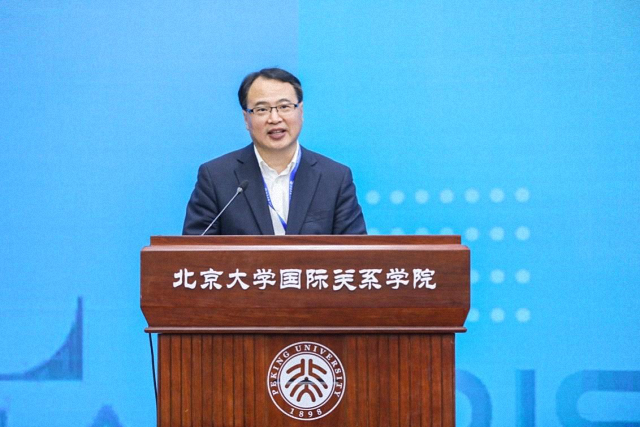
Prof. Wang Yong
Professor Tang Shiqi delivered a written speech titled "Comprehensive Security: The Reverse Definition of Risk and Political Logic" (read by Director Zhuang Jun on behalf of the editorial department of the Journal of International Politics). Based on a conceptual reflection on security, he proposed using risk, rather than threats or dangers, as the opposing concept to redefine the concept of security. On this basis, he attempted to construct a theory of comprehensive security, discussing the needs and agenda of comprehensive security, and using the framework of comprehensive security to reexamine security dilemmas.

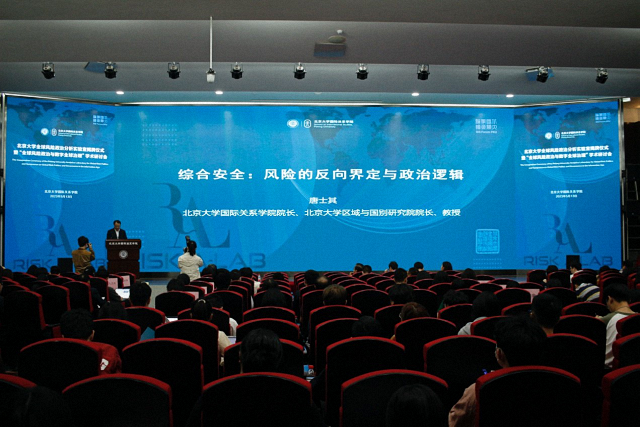
Prof. Tang Shiqi (written statement)
Professor He Maochun, Counselor of the State Council, Director of the Center for Economic Diplomacy at Tsinghua University, and Professor of the Department of International Relations at Tsinghua University, spoke on the topic of "Illusions and Opportunities in the Analysis of International Relations Risks." He first distinguished the research methods and methodologies of risk, pointing out that risk research should approach real risk data, the truth of events, and the reasons for changes. Due to the artificial nature of risk, it is also necessary to approach the human factor. Importantly, risk research should not only focus on risk avoidance and risk governance but also explore how to seize opportunities and strive for progress amid risks.

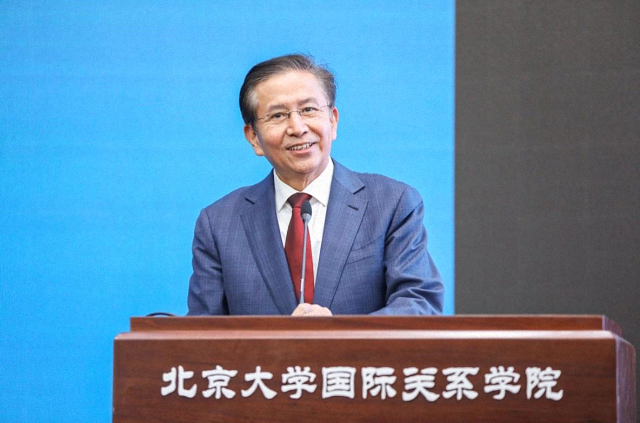
Prof. He Maochun
Wu Xinbo, Director of the Institute of International Studies at Fudan University, Director of the Fudan University America Research Center, Vice President of Fudan Development Institute, and Distinguished Professor, spoke on "Exploring the Boundaries of Sino-U.S. Strategic Competition." He pointed out that the evolution of Sino-U.S. relations has far exceeded expectations. Due to the influence of trend and structural factors, significant improvement in Sino-U.S. relations in the foreseeable future is not realistic. The urgent task is to define the boundaries of Sino-U.S. strategic competition. Risks have a more specific direction compared to challenges, which is helpful for strategic communication.

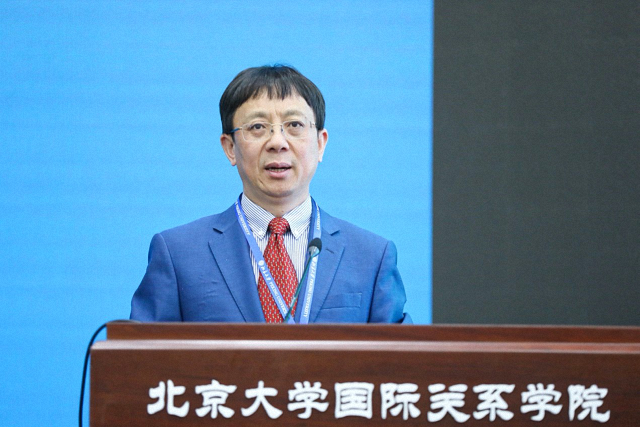
Prof. Wu Xinbo
Professor Xitianyang, Assistant Dean of the National School of Development at Peking University, delivered a presentation on the topic "The Constructive Logic of National Governance Index." He showcased an ongoing research project led by his team, focusing on the replication and analysis of existing governance indices. The presentation highlighted the significance of uncovering inherent biases in these indices, particularly in the assessment of governance in developing countries. These biases underscore the value definition of governance models behind the index system, emphasizing the necessity and importance of constructing a new evaluation index system based on China's own governance experiences and models.

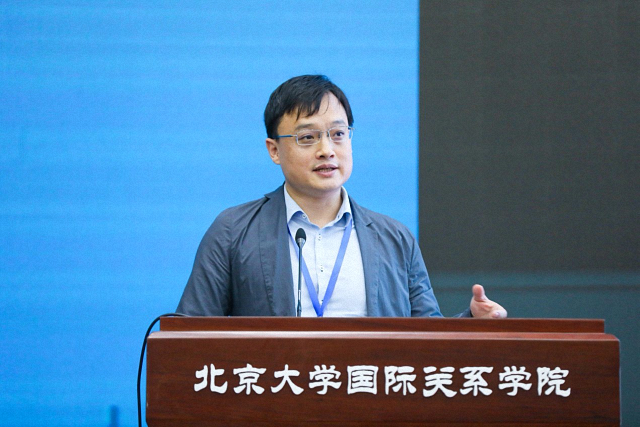
Prof. Xi Tianyang
Professor Li Yong, Vice Dean of the School of Economics at Renmin University of China, Professor of Econometrics and Finance, and researcher at the Institute of Statistics and Big Data, sent a video presentation to the conference. In his report, he discussed the innovative solution proposed by his team to address the serious issue of the misuse of p-values in hypothesis testing. This solution combines Bayesian and frequentist approaches, which are traditionally seen as conflicting in the philosophy of hypothesis testing, aiming to avoid the problem of P-Hacking.
The afternoon session was divided into three parallel thematic academic discussion sessions. The topics of seminar one were "Global Geopolitical Risks and Digital Global Governance." The seminar was successively chaired by Associate Professor Jie Dalei from the School of International Relations at Peking University and Director Zhuang Jun of the Journal of International Politics. Assistant Professor Qi Haotian from the School of International Relations at Peking University and Professor Yuan Zhengqing from the University of the Chinese Academy of Social Sciences commented. Eight guests from Peking University, the Chinese Academy of Social Sciences, Tsinghua University, Harvard University, Renmin University of China, and the School of International Relations delivered speeches. Teacher Lai Huaxia summarized the quantitative research of international economic law, emphasizing the importance of reflecting and respecting the disciplinary characteristics and logic of international law when collecting data. Teacher Chen Zhaoyuan focused on the impact of foreign direct investment on armed conflicts in host countries, finding significant differences in the impact of Western and Chinese direct investment on developing countries. Dr. Wu Xian analyzed the destructive power of the Society for Worldwide Interbank Financial Telecommunication (SWIFT) as a "financial weapon" and traced the historical process of the United States turning SWIFT into a sanctions tool. Dr. Liu Qi discussed the "moral risks" in the global network of bilateral currency swap agreements, pointing out that the imbalance in responsibility and obligation may lead to greater moral hazards for countries on the edge of the network, while central countries tolerate this risk rather than using coercive measures to control moral hazards in the network. Teacher Qi Haixia proposed that the globalization process increases the connotation and diffusion speed of "risks," and the uniqueness of risk analysis from an international relations perspective lies in its objectivity while also relying on the subjective judgment of decision-makers. Teacher Zuo Xiyin pointed out that in the post-Cold War era, the United States not only reaped the benefits of hegemony but also faced profound challenges to the international order it dominated. Teacher Yang Yuan believed that in the strategic interaction between states, rational decision-makers would selectively enter the final game, and giving sufficient attention to the self-selection effect is crucial for predicting global political risks. Teacher Cao Wei analyzed the multilateral factors affecting the consistency of U.S. and allied policies, finding that the strategic environment has a significant impact, beyond the scope of bilateral competition, creating high-order effects.

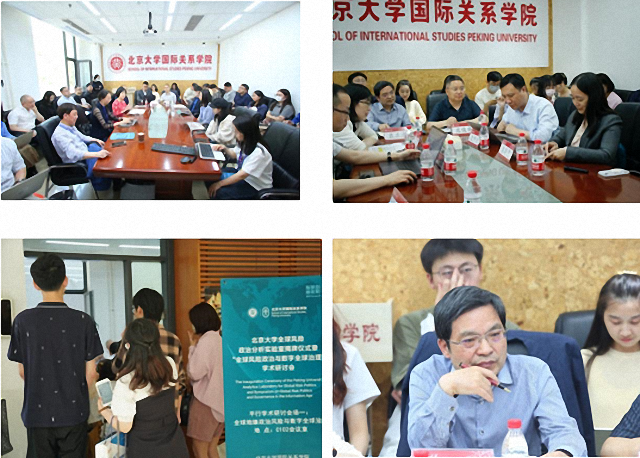
Scenes from Session I: "Global Geopolitical Risk and Digital Global Governance"
The topic of seminar two was "Data and Methods for Global Risk Governance." The seminar was chaired by Assistant Professor Lu Xiao from the School of International Relations at Peking University. Ten guests from Peking University, Tsinghua University, Renmin University of China, Massachusetts Institute of Technology, University of Mannheim in Germany, Durham University in the United Kingdom, and Mohammed VI University of Science and Technology in Morocco successively spoke. Professor Chen Jidong mainly explored government responsiveness in urban governance and public acceptance of big data technology. He found that increased government responsiveness has increased public acceptance of health codes. Professor Huang Jing used voting data analysis to explore the diversity and complexity of alliances in the United Nations and analyzed the dimensions of alliance issues. Professor Wang Xi used high-frequency information to predict low-frequency information, finding that when macro data volume is large enough, textual information data has a small impact on real-time GDP forecasting. Professor Zhou Yi mainly explored the network structure characteristics and temporal trend changes of political factions in international relations. He believed that during the period from 1980 to 2019, the number of countries in the largest factions increased, and the world seemed to show a trend of integration, but the proportion of internal and external connections within factions decreased. Professor Zhang Yang shared research on whether online public opinion events would affect government credibility. He found that condemnation targets in online public opinion are mainly the public itself, experts, and the media, and government credibility is not significantly affected. Professor Esenwein studied whether the second voting qualification would reduce public populist attitudes. He found that the second voting qualification did not significantly affect the support for populism among high-skilled voters, but the support among low-skilled voters decreased. Professor Traunmüller mainly studied the impact of wartime sexual violence on the participation of victims in public affairs. He found that victims do not avoid participating in public affairs due to this shameful experience; instead, they actively cope with the social shame and challenges brought by the experience. Professor Bruch introduced the application of supervised learning methods in the cross-domain topic classification of political texts. Although the accuracy of different topics varies greatly, the proposed classification method generally accurately matches the topics in parliamentary debates. Professor Rader shared two studies, one exploring the impact of Turkey's lockdown policy during the COVID-19 pandemic on public sentiment towards refugees, and the other exploring how to measure the degree of resource mobilization of social movements on Twitter.

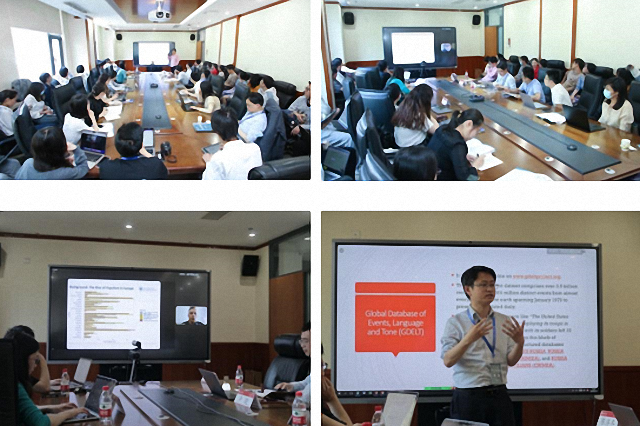
Scenes from Session II: "Data and Methods for Global Risk Governance"
The topic of seminar three was "Global Climate Risk Politics and Digital Global Governance," chaired by Assistant Professor Xu Qinyi from the School of International Relations at Peking University. Seven guests from the School of Diplomacy, Beijing Language and Culture University, Tsinghua University, Central Party School, Asian Infrastructure Investment Bank, Beijing Green Research Public Welfare Development Center, and other institutions participated in heated discussions. Seminar played a video speech by Professor Nazia Mintz-Habib, Director of the Resilience and Sustainable Development Research Center at the University of Cambridge. Mr. Dong Liang mainly analyzed the background of the global climate crisis, Sino-U.S. climate cooperation, and its impact on the climate process. Ms. Hu Wangyun focused on "risks in SDGs governance from a multidisciplinary perspective," believing that risk politics places risks in the context of world politics. Whether a risk is acceptable depends on whether the uncertainty is acceptable, and the combination of risk control force and acceptance builds a framework for interpreting and predicting policies and actions. Ms. Yang Xiu mainly researched the "risks and countermeasures faced by urban lifelines in the face of climate change," pointing out that cities are the core force in dealing with climate change, but urban lifelines themselves face significant risks and need comprehensive capacity building. Ms. Guo Hongyu studied the opportunities and challenges of overseas investment and financing for renewable energy, believing that new strategies are needed to support the development of renewable energy companies. Professor Zhang Han focused on the topic of "the frontiers of constructing an international carbon pricing system and China's participation," suggesting that carbon pricing types include explicit carbon tax policies and implicit carbon market quantity policies. He proposed specific policy designs.

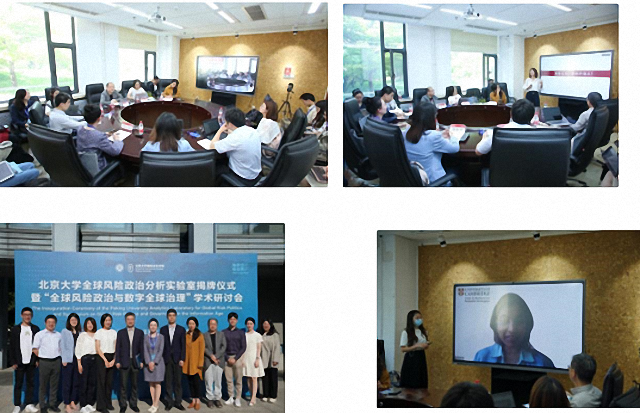
Scenes from Session III: "Global Climate Risk Politics and Digital Global Governance"
The conference was academically intense and warmly welcomed by university students inside and outside the school. The parallel forum meeting room was full, and there were even scenes of students queuing outside the venue for seats, creating an unprecedented scene.
After the parallel academic discussion session, the conference entered the closing ceremony. Professor Pang Xun comprehensively summarized the conference from an academic perspective. Professor Zhang Haibin, on behalf of the school, expressed heartfelt thanks for the strong support from the university, the brilliant speeches of the experts and scholars, and the hard work of the conference team. The unveiling ceremony of the Peking University Global Risk Political Analysis Lab and the "Global Risk Politics and Digital Global Governance" academic seminar came to a successful conclusion.

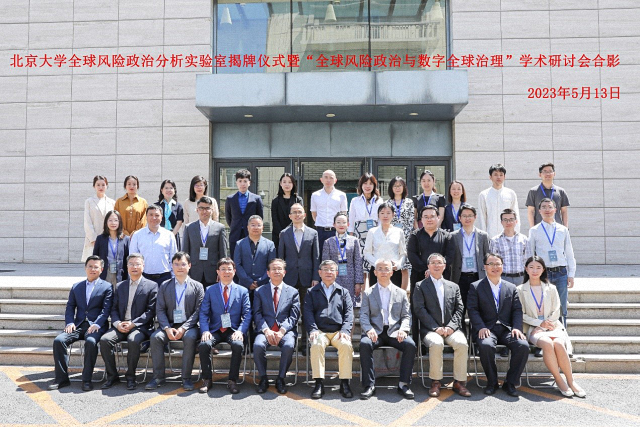
Group photo of conference guests
Writer: Gao Jingwen
Photography: Li Xianghua, Xiong Wanting
Editor-in-Chief: Pang Xun
